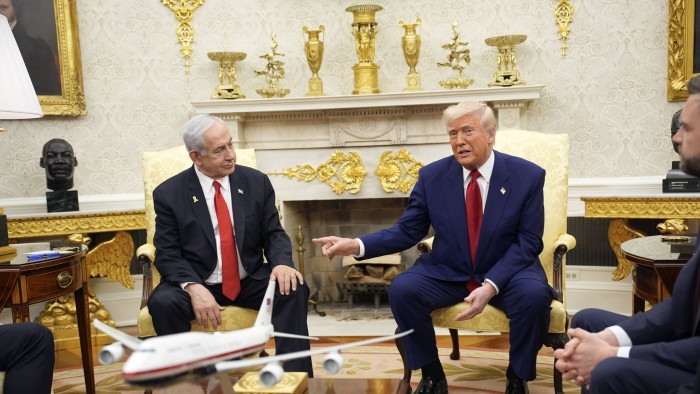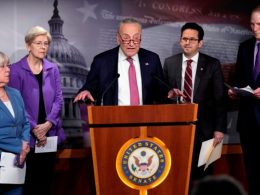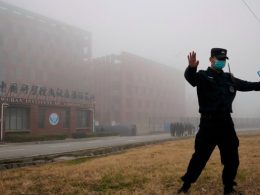Unlock the White House Watch newsletter for free
Your guide to what the 2024 US election means for Washington and the world
President Donald Trump has announced the US would hold direct talks with Iran on curtailing Tehran’s nuclear programme, in a sign of possible progress in one of the Middle East’s most intractable problems.
Trump said the talks on Saturday would be “very high level”. “We’re dealing with them directly,” he said. “Maybe a deal’s going to be made — that’d be great.”
Trump was speaking after talks on Monday with Israeli Prime Minister Benjamin Netanyahu which had touched on Iran, as well as US tariffs on Israel and the war in Gaza.
Netanyahu said the two were “united in the goal that Iran doesn’t get nuclear weapons”.
Trump added “everyone agrees that doing a deal [with Iran] would be preferable to doing the obvious” — an apparent reference to destroying Iran’s nuclear capability by military means.
“And the obvious is not something that I want to be involved with or frankly that Israel wants to be involved with if they can avoid it,” he added.
The Islamic republic has not indicated that either direct or indirect negotiations between Iran and the US are under way.
Iran’s supreme leader Ayatollah Ali Khamenei, has ruled out talks with the Trump administration, citing the reimposition of sanctions and Washington’s threats of military action if Tehran refuses to compromise on its nuclear programme and its military and regional policies.
However, Iranian diplomats have suggested indirect talks through intermediaries such as Oman could be possible if they were limited strictly to the nuclear file.
Tehran has made it clear that its ballistic missile programme and its support for anti-Israel militant groups in the region are not open to negotiation.
Hopes of a revival of diplomatic contacts between Washington and Tehran to resolve the nuclear stand-off were boosted last month when Trump sent a letter to Khamenei, saying he wanted an agreement with the Islamic Republic.
But in subsequent days he warned that if Iran did not agree to a deal “there will be bombing and it will be bombing the likes of which they have never seen before”.
In 2018, Trump pulled the US out of the Joint Comprehensive Plan of Action, or JCPOA, the 2015 international accord designed to strictly limit Iran’s nuclear activities. The agreement, which had the buy-in of Europe, Russia and China as well as the US and Iran, had been considered a major achievement in global diplomacy.
Trump then reimposed damaging sanctions on the Islamic republic, the start of his so-called “maximum pressure” campaign.
Since his return to the White House in January, the president has faced the repercussions of his 2018 decision, with Iran aggressively expanding its nuclear activity.
Many countries fear Tehran could be close to weaponising its stockpile of highly enriched uranium to become the world’s 10th nuclear power.
With Israel warning it will not tolerate a nuclear-armed Iran, there are fears that if left unchecked the Islamic republic’s nuclear ambitions could trigger a new war in the Middle East.
Trump said the agreement he intended to negotiate with Iran this time would be “different and maybe a lot stronger” than the JCPOA, without providing details.
“I think if the talks aren’t successful with Iran, I think Iran is going to be in great danger, and I hate to say it, great danger because they can’t have a nuclear weapon,” Trump said. “You know it’s not a complicated formula.”
Iran has said that if any new talks were to take place, they would aim to explore the possibility of an agreement similar to the JCPOA.
Trump also praised Netanyahu for his efforts to free 59 Israeli hostages from Hamas’s captivity. The Israeli prime minister has faced widespread criticism and street protests over his decision to rip up a ceasefire with the Palestinian militant group instead of entering negotiations to end the war in exchange for the remaining hostages’ freedom.
Without providing details, Trump said a new ceasefire could be possible, but the decision was up to Netanyahu.
The president also repeated his long-term plans for Gaza as a real estate opportunity that would be made possible if the Palestinian population could be convinced to emigrate to unnamed countries.
He briefly suggested the possibility of a US-led peacekeeping force to secure the area.
“If you take the Palestinian people and move them around to different countries, you really have a Freedom Zone,” Trump said.
That plan has been widely condemned in the Arab world, but embraced by Netanyahu, who portrayed it as a humanitarian gesture that would allow refugees to flee a war zone.
Source link









